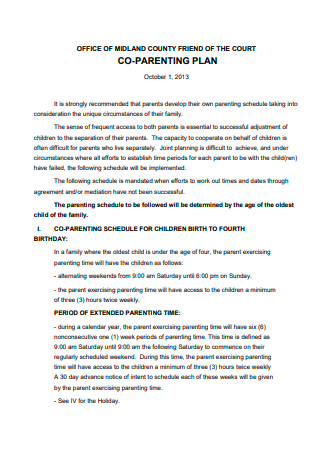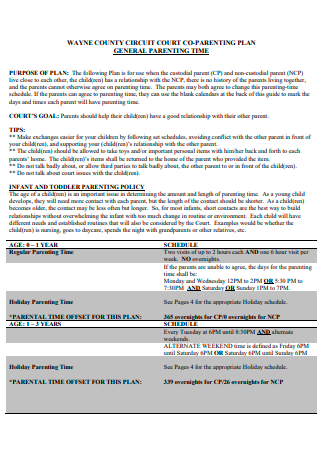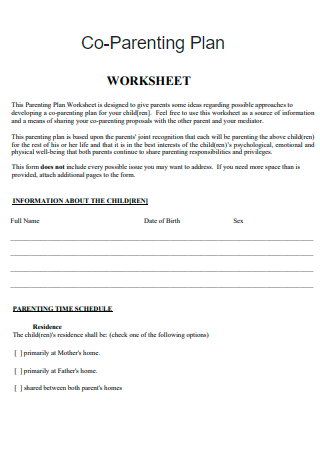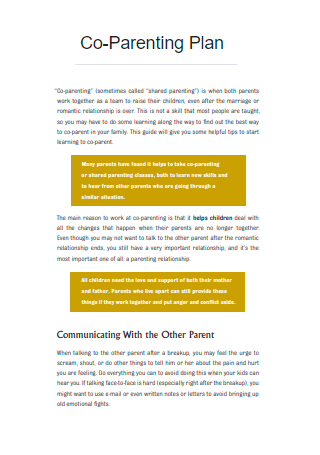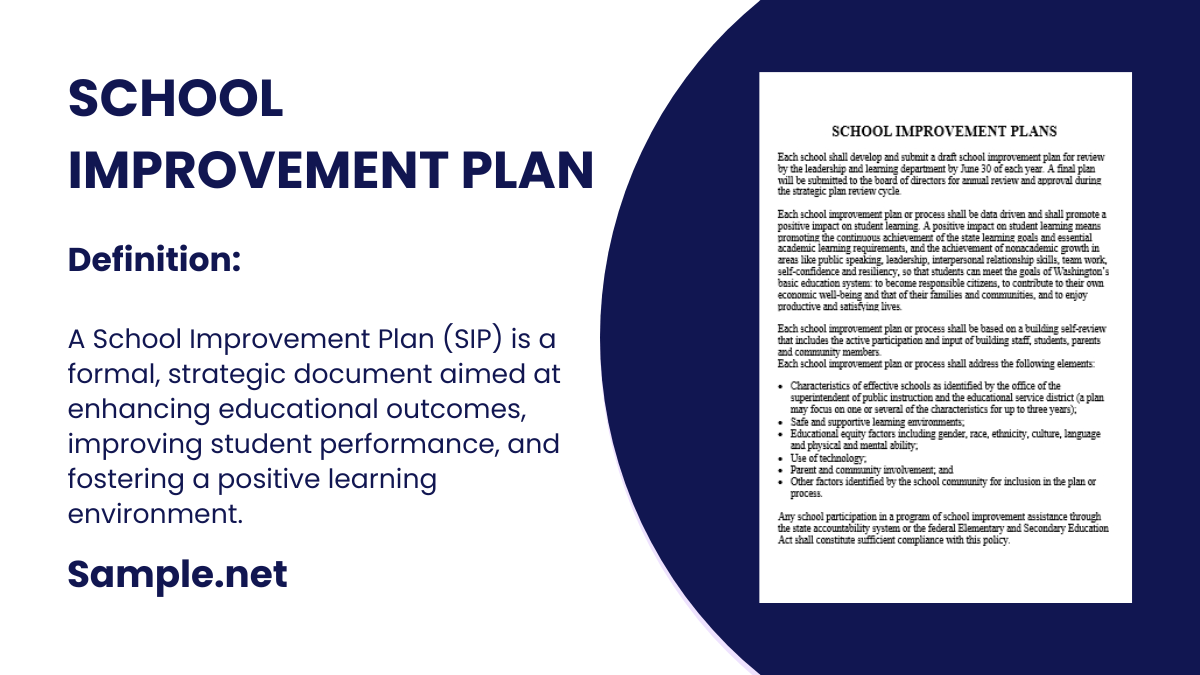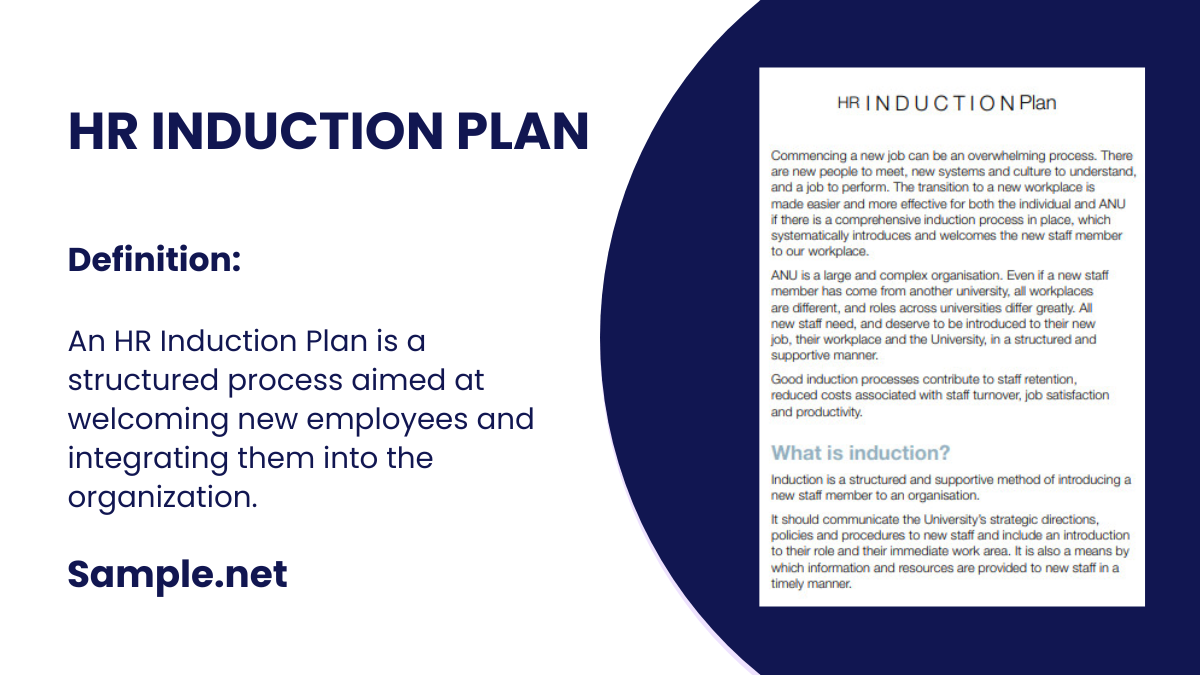A School Improvement Plan is a strategic blueprint aimed at enhancing educational outcomes for students. It outlines clear goals, targeted actions, and measurable benchmarks to ensure continuous development in…
continue reading
3+ Sample Co-Parenting Plan
What Is Co-Parenting?
Co-parenting is a form of post-divorce parenting in which both parents continue to share responsibility for their children’s upbringing and activities. This requires considerable interaction between the parents. Today, 15% of children live with remarried parents, 7% with cohabiting parents, and 26% with single parents. According to the study, the three-year mark is a watershed moment in relationships.
Benefits of Co-Parenting
Without a doubt, maintaining a healthy relationship with your partner while also parenting your children is the ideal situation. While this is often the intention of many couples, it frequently does not work out that way, and they find themselves having to learn a new way of parenting while living apart. There are numerous ways to parent separately, but today we will discuss co-parenting. The critical point here is that, despite their separation, the parents meet to raise their children. This is not to be mistaken with parallel parenting, in which separated couples raise their children alone of one with little or no interaction from the other parent. As you might imagine, co-parenting benefits the children involved because it provides stability, consistency, and clear boundaries, even across two homes. The following are some advantages of co-parenting your children after a divorce agreement. Hopefully, they will assist you in charting a successful course through the parenting plan to raise happy, healthy children, even if you divorce.
Tips In Having an Effective Co-Parenting Relationship
Two parents must put in a great deal of effort to reach the point where they can say their co-parenting relationship is going swimmingly. There is still space for progress in the majority of families. Rather than concentrating on what isn’t working, however, identify what is so that you can emphasize the positive as you work to resolve conflicts with your ex. The following indicators point to a positive and productive co-parenting relationship. Consider what operates for you, as well as the areas in which you wish to improve.
How To Create a Perfect Co-Parenting Plan
At first, divorce appears to be a win-lose situation. On paper, one parent may appear to have everything, while the other struggles to make ends meet. On the other hand, the parent who seems to have it all discovers that they have little time to spend with their children, whereas the other parent is constantly with them. Whether or not this example applies to you, striking a balance between family life, your child’s best interests, emotions, and everything else is critical for any family when developing the ideal parenting plan. Numerous factors must be considered when developing the best parenting plan for your family, from schedules and holidays to finances and communication. While your situation may require you to consider additional factors and steps, these six fundamental steps will assist any parent in creating the ideal parenting plan.
-
1. Recognize the best interests of your child
The ideal parenting plan should prioritize your kid’s finest attractions. Their best interests cover essential parts of their lives, including physical and emotional requirements. You may already know what your child’s best interests are, but taking the time to think about them can help you develop a “map” that will lead you to create the ideal parenting plan. Every family is unique. Therefore you must tailor your parenting practice to match your family’s particular needs. When creating a plan that is in your child’s best interests, it can be beneficial to address both their physical and emotional requirements. When determining their child’s best interests, some parents may additionally consider their child’s specific wishes. Their age and developmental stage significantly influence how much weight their wishes have. Remember that these are only a few considerations for your child’s best interests to consider as you develop your parenting strategy. Make sure to address any other unique issues with your child or household.
2. Make a parenting routine that works for you.
Your new family practice will be dictated by your parenting timetable, which will give everyone thought of how much time your child will consume with you and your co-parent. It’s a vital part of your parenting strategy, so make sure you identify and keep a schedule that works for your family. It’s also worth mentioning that as your child grows and changes, your parenting routine may adapt to match their requirements. A younger child may do better with regular visits from both parents, although older children may cope better with fewer transitions. For many families, parenting schedules with a 50/50 time split are ideal, but they are insufficient for others. Those who adhere to a different plan may find that alternating weekends and midweek visits are viable. However, if one parent lives too far away for regular visits, you can try arranging for your child to spend an extended length of time with that parent, such as during summer or winter break. Don’t forget to plan for holidays and important events like birthdays in addition to your regular parenting schedule. Dealing with these dates will be easier if you have a good plan.
3. Make a communication strategy.
It’s natural to expect that once you settle into your shared parenting practice, you’ll figure out the ideal way to speak with your co-parent and your children. However, as your child begins to move between homes and you are faced with the challenge of keeping all of their most critical information organized and accessible in both places, you may wish for a more structured method of communication. Don’t put off making communication judgments till then. Choose how you and your co-parent will communicate and share updates about your child as part of your parenting plan. When you’re separated from your children, video messaging or a daily phone call might help make the distance feel shorter.
4. Understand how you’ll make significant decisions and manage legal custody.
Major life choices involving your child are not to be taken lightly. As such, if you and your co-parent convey legal custody, develop a strategy for making joint decisions. You will face various choices over time, including those regarding your child’s education, medical treatment, religious practice, and cultural influences. Document your initial decisions in your parenting plan and develop a strategy for communicating these issues in the future. Also, put a plan in place for critical decisions that must be made during an emergency. As much as you hope you never find yourself in a scenario where a hasty decision must be made, such as in the possibility of an injury, it is unquestionably better to be prepared if you are.
5. Examine your child’s financial situation.
Regardless of how legal and physical custody and parenting obligations are divided, both parents are often considered financially liable for their children to some extent. Child support is frequently ordered to help fund a child’s basic living expenses and luxuries, especially if one parent has more financial resources than the other. Make sure you understand what your child support payments will cover. Keeping a constant journal of child-related expenses will help you keep track of what you’ve spent.
FAQs
What should a co-parenting agreement include?
By establishing and including paternal and maternal information in the agreement, a parent can protect their child’s right to raise the child and ensure financial assistance. Custody is either legal or joint—protracted legal proceedings in an emergency.
Should coparents communicate on a daily basis?
Keep your communication with your co-parent focused on the subject at hand. This does not imply you should communicate several times a day — aim for once or twice a week and keep communications brief and to the point.
What is co-parenting in parallel?
Parallel parenting is a tactic used by separated parents to prevent touch by limiting their interactions. This parenting method enables both parents to be involved in their child’s upbringing without interfering with the life of their ex-spouse.
Co-parenting means prioritizing your children’s needs and well-being at its most fundamental level. It’s cooperating with your co-parent honestly and openly to address those needs and create happy, healthy children. This entails providing children with the stability they deserve while acknowledging that life is not flawless. It will require cooperation and adaptability on the part of all stakeholders. Co-parenting is motivated by the desire to raise children who will remember their parents with warmth and respect for their work for their benefit. To conclude, I hope this article has aided you in your efforts to co-parent your child with your partner.

